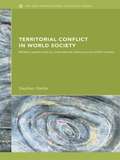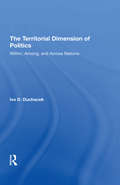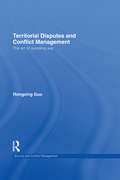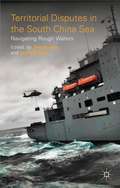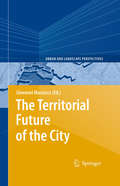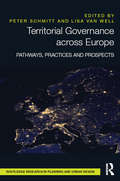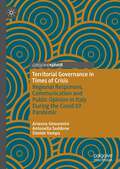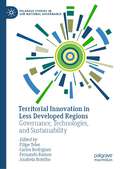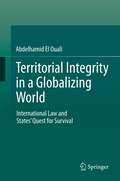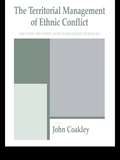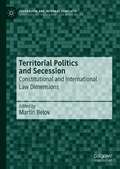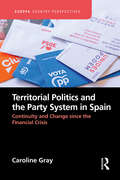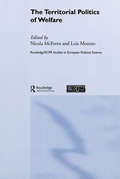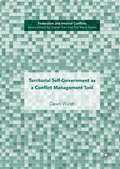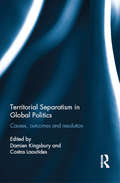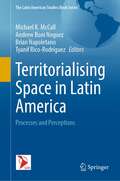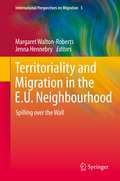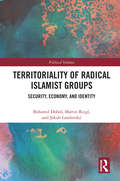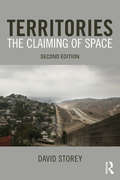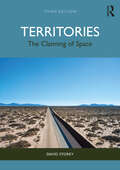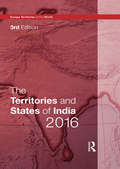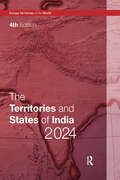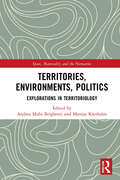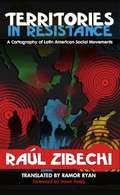- Table View
- List View
Territorial Conflicts in World Society: Modern Systems Theory, International Relations and Conflict Studies (New International Relations)
by Stephan StetterBy bringing into dialogue modern systems theory and international relations, this text provides theoretically innovative and empirically rich perspectives on conflicts in world society. This collection contrasts Niklas Luhmann’s theory of world society in modern systems theory with more classical approaches to the study of conflicts, offering a fresh perspective on territorial conflicts in international relations. It includes chapters on key issues such as: conflicts and human rights conflicts in the Middle East and sub-Saharan Africa war and violence Greek-Turkish relations conflict theory the role of states in world societal conflicts legal territorial disputes in Australia hegemony and conflict in global law conflict management after 9/11. While all contributions draw from the theory of world society in modern systems theory, the authors offer rich multi-disciplinary perspectives which bring in concepts from international relations, peace and conflict studies, sociology, law and philosophy. Territorial Conflicts in World Society will appeal to international relations specialists, peace and conflict researchers and sociologists.
The Territorial Dimension Of Politics: Within, Among, And Across Nations (Constitutional Government In Theory And Practice Ser.)
by Ivo D. Duchacek Helena DuchacekThis comparative study examines the dialectical tensions between global and regional interdependence and the fragmentation of humankind into territorial entities. Political authority may remain territory-bound, but borders increasingly are penetrated by pollutants, individuals, noncentral governments in search of foreign trade and investment, and transnational corporations, as well as the traditional exchanges of trade, media, and culture. The result of these transborder flows, accelerated by new technologies, is a new variety of international relations among “perforated sovereignties.†Dr. Duchacek analyzes the territorial organization of political authority in both democratic and authoritarian frameworks as well as in unitary and federal systems. Case studies focus on new forms of transborder interactions between neighboring countries, especially in North America and in Western Europe. The book is of major interest to scholars in the fields of political science and political economy. Quotations from a variety of political theorists and practitioners, illustrative diagrams, and maps make the book suitable for students of comparative politics, international relations, comparative federalism, and public policy.
Territorial Disputes and Conflict Management: The art of avoiding war (Routledge Studies in Security and Conflict Management)
by Rongxing GuoThis book examines the problems of boundary demarcation and its impact on territorial disputes, and offers techniques to manage and resolve the resulting conflicts. Historically, most civil conflicts and internal wars have been directly related to boundary or territorial disputes. Cross-border discord directly affects the sustenance and welfare of local populations, often resulting in disease, impoverishment, and environmental damage as well as creating refugees. Although the impact of territorial disputes is great, they can often be settled through bilateral, and sometimes multilateral, agreements or international arbitration. This book sets out to probe into the problems of existing techniques on boundary demarcation and to test their possible impacts on boundary and territorial disputes. Various factors and their influences on cross-border tensions are tested, either qualitatively or quantitatively. After close examination of dozens of the most significant cases, the book presents various alternative solutions to the achievement of cross-border cooperation in disputed territories. An ‘art of avoiding war’ is included within the book, comprising six key schemes and five negotiating techniques. The comparative advantages, costs and benefits of each of these is analyzed and evaluated. This book will help guide practitioners in territorial disputes and will be of interest to students of conflict management, international security, peace and conflict studies, political violence and IR in general.
Territorial Disputes In The South China Sea
by Jing Huang Andrew BilloHeightened tensions in the South China Sea have raised serious concerns about the dangers of conflict in this region as a result of unresolved, complex territorial disputes. This volume offers detailed insights into a range of country-perspectives, addressing the historical, legal, structural, regional and multilateral dimensions of these disputes
The Territorial Future of the City
by Giovanni MacioccoThe volume brings together contributions by leading scholars and young academics with experience in the urban potential of the territory in situations not necessarily linked to the dense metropolis, its compact form or to city sprawl. What brings these scholars together is their common reflection on this central theme, though from varied disciplinary and experimental backgrounds. They offer new forms of representing social and spatial processes of the contemporary society.
Territorial Governance across Europe: Pathways, Practices and Prospects
by Peter Schmitt Lisa Van WellThis book provides a comprehensive framework for analysing, comparing and promoting territorial governance in policy relevant research. It reveals in-depth considerations of the emergence, state-of-the art and evolution of the concept of territorial governance. A unique series of ten case studies across Europe, from neighbourhood planning in North Shields in the North East of England to climate change adaptation in the Baltic Sea Region, provides far-reaching insights into a number of key elements of territorial governance. The book draws generalised empirically-based conclusions and discusses modes of transferability of ‘good practices’. A number of suggestions are presented as to how the main findings from this book can inform theories of territorial governance and spatial policy and planning. Territorial Governance across Europe will be of considerable interest to scholars around the world who are concerned with European studies, regional policy, urban and regional planning, and human and political geography. It provides a solid debate on discourses, theories, concepts and methods around the notion of territorial governance as well as a number of empirical findings from various contexts across Europe. It specifically targets scholars involved in policy-relevant research.
Territorial Governance in Times of Crisis: Regional Responses, Communication and Public Opinion in Italy During the Covid-19 Pandemic
by Arianna Giovannini Antonella Seddone Davide VampaThis book offers a comprehensive exploration of multi-level governance, political communication and public opinion in Italy during the Covid-19 emergency. Italy’s territorial arrangements of blending aspects of unitary and federal systems within a ‘regionalized’ framework underscore the tensions between centralization and decentralization, a theme echoed in many other nations. Given the state of flux and lack of clear direction of Italian regionalism at the onset of the pandemic, the analysis provides particularly interesting insights into the effects of this unprecedented crisis on regional dynamics. Covid-19 acted as a catalyst, amplifying and exacerbating existing territorial disparities, while also highlighting the resilience and adaptability of some regions. The book delves into the national and sub-national responses to the pandemic, examines how politicians and regional leaders presented them, and how citizens perceived these responses. Through this analysis, it provides deeper insights into the intricate interplay between centralization and decentralization, as well as the diverse strategies employed to address a wide spectrum of health, social, and economic challenges. Ultimately, by moving from institutions to citizens, the book reflects on how external shocks can both challenge the democratic underpinnings of decentralization and offer opportunities to strengthen them.
Territorial Innovation in Less Developed Regions: Governance, Technologies, and Sustainability (Palgrave Studies in Sub-National Governance)
by Filipe Teles Carlos Rodrigues Fernando Ramos Anabela BotelhoThis book examines the roles of communities in the general framework of territorial innovation, particularly in the context of less developed regions. With a specific focus on Portugal, it offers conceptual improvements that will be of use to other European regions. The book will appeal to scholars and students of regional governance and politics, from public administration to economics, sociology, geography and political science, as well as to practitioners.
Territorial Integrity in a Globalizing World
by Abdelhamid El OualiThis book offers a comprehensive, highly informative and interdisciplinary study on territorial integrity and the challenges globalization, self-determination and external interventions present. This study aims at not only to fill an epistemological gap in this regard, but also answer the question of whether International Law is adequately equipped to help states address these challenges. The author argues that the biggest threat that many states are confronted with today is their disintegration rather than their obsolescence, and that International Law has not often been able to prevent that eventuality. In fact, states, when they were not destroyed by war, managed to survive, thanks to the flexibility of territoriality, i.e. their ability to adjust to difficult situations as they arose. It is this understanding of adaptation that urges an increasing number of states today to revive territorial autonomy and restore an original understanding of self-determination in which democracy is a pivotal factor in establishing congruence between the states and their nations. While this move is endorsed by International Law, it is not the case for globalization; for their own sake, proponents of globalization should recognize that the states are irreplaceable as long as they remain the sole providers of protection for their peoples.
The Territorial Management of Ethnic Conflict (Routledge Studies in Federalism and Decentralization #Vol. 9)
by John CoakleyThe object of this book is to look at the manner in which states attempt to cope with ethnic conflict through territorial approaches. This revised edition has new chapters covering Northern Ireland, South Africa and Yugoslavia.
The Territorial Peace: Borders, State Development, and International Conflict
by Douglas M. GiblerThere is continued discussion in international relations surrounding the existence (or not) of the 'democratic peace' - the idea that democracies do not fight each other. This book argues that threats to homeland territories force centralization within the state, for three reasons. First, territorial threats are highly salient to individuals and leaders must respond by promoting the security of the state. Second, threatened territories must be defended by large, standing land armies and these armies can then be used as forces for repression during times of peace. Finally, domestic political bargaining is dramatically altered during times of territorial threat; with government opponents joining the leader in promoting the security of the state. Leaders therefore have a favorable environment in which to institutionalize greater executive power. These forces explain why conflicts are associated with centralized states and in turn why peace is associated with democracy.
Territorial Politics and Secession: Constitutional and International Law Dimensions (Federalism and Internal Conflicts)
by Martin BelovThis book offers a broad perspective of revolutionary territorial politics by putting secession in the context of other forms of revolutionary territorial politics. This allows for a more complex and profound account of secession and offers the reader a conceptual approach to politics of revolutionary discontent with territorial status quo. Second, the book provides a multidiscoursive approach which combines the efforts of constitutional and comparative constitutional law scholars with international lawyers, EU lawyers and specialists in international relations. This allows for multifaceted and, in that regard, more adequate, balanced and rich analysis of secession and the other forms of revolutionary territorial politics.
Territorial Politics and the Party System in Spain: Continuity and change since the financial crisis (Europa Country Perspectives)
by Caroline GrayAcross Western Europe, the global financial crisis of 2008 and its aftermath not only brought economic havoc but also, in turn, intense political upheaval. Many of the political manifestations of the crisis seen in other Western and especially Southern European countries also hit Spain, where challenger parties caused unprecedented parliamentary fragmentation, resulting in four general elections in under four years from 2015 onwards. Yet Spain, a decentralised state where extensive powers are devolved to 17 regions known as ‘autonomous communities’, also stood out from its neighbours due to the importance of the territorial dimension of politics in shaping the political expression of the crisis. This book explains how and why the territorial dimension of politics contributed to shaping party system continuity and change in Spain in the aftermath of the financial crisis, with a particular focus on party behaviour. The territorial dimension encompasses the demands for ever greater autonomy or even sovereignty coming from certain parties within the historic regions of the Basque Country, Catalonia and, to a lesser extent, Galicia. It also encompasses where these historic regions sit within the broader dynamics of intergovernmental relations across Spain’s 17 autonomous communities in total, and how these dynamics contribute to shaping party strategies and behaviour in Spain. Such features became particularly salient in the aftermath of the financial crisis since this coincided with, and indeed accelerated, the rise of the independence movement in Catalonia.
The Territorial Politics of Welfare (Routledge/ECPR Studies in European Political Science)
by Nicola Mcewen Luis MorenoThis is a major contribution to our understanding of European integration. It analyzes for the first time, in a highly systematic fashion, European integration as transnational political society formation in a common political space. Four conceptual chapters discuss different approaches to studying European 'transnationalization' including networks and socialization. Six empirical chapters provide in-depth studies of different aspects of this process and policy fields ranging from European party networks and university collaboration to informal economic governance in the Eurozone and police collaboration across borders. This book redresses the excessive concentration in EU research on supranational policy-making and inter-state bargaining. It will be of great interest to political scientists as well as contemporary historians, sociologists and lawyers.
Territorial Self-Government as a Conflict Management Tool (Federalism and Internal Conflicts Ser.)
by Dawn WalshThis book provides an in-depth narrative of the difficulties facing Territorial Self-Government institutions across Northern Ireland, Bosnia, the former Yugoslav Republic of Macedonia, Moldova, and Iraq. It brings together analyses of both prominent and lesser known cases to provide a broad overview of how Territorial Self-Government operates as a conflict management tool in different contexts. Drawing on lessons from these five cases, the author demonstrates the importance of designing and implementing international guarantees to self-government and the associated difficulties. Domestic capacity development must be encouraged and international actors needs to balance the guarantees aimed at providing stability with their wider security and economic concerns. The volume also strongly connects to broader research and theory on conflict management, particularly the role of institutional design and international assistance.
Territorial Separatism in Global Politics: Causes, Outcomes and Resolution (Routledge Studies in Civil Wars and Intra-State Conflict)
by Damien Kingsbury Costas LaoutidesThis volume examines the various aspects of territorial separatism, focusing on how and why separatist movements arise. Featuring essays by leading scholars from different disciplinary perspectives, the book aims to situate the question of separatism within the broader socio-political context of the international system, arguing that a set of historical events as well as local, regional, and global dynamics have converged to provide the catalysts that often trigger separatist conflicts. In addition, the book marks progress towards a new conceptual framework for the study of territorial separatism, by linking the survival of communities in international politics with the effective control of territory and the consequent creation of new polities. Separatist conflicts challenge conventional wisdom concerning conflict resolution within the context of international relations by unpacking a number of questions with regard to conflict transformation. Through the use of case studies, including Cyprus, the Rakhine state in Myanmar, the Shia separatism in Iraq, the Uighurs in China and the case of East Timor, the volume addresses key issues including the role of democracy, international law, intervention, post-conflict peacebuilding and the creation of new political entities. The book will be of much interest to students of Intra-StateConflict, Conflict Resolution, International Law, Security Studies and International Relations.
Territorialising Space in Latin America: Processes and Perceptions (The Latin American Studies Book Series)
by Michael K. McCall Andrew Boni Noguez Brian Napoletano Tyanif Rico-RodríguezThe vision of this book is to bring together examples of grounded geographic research carried out in Latin America regarding territorial processes. These encompass a range of histories, processes, strategies and mechanisms, with case studies from ten countries and many regions: struggles to reclaim indigenous lands, conflicts over land/resource/environmental services, competing land claims, urban territorial identities, state power strategies, commercial involvements and others. The case studies included in the book represent a wide diversity of theoretical and methodological framings currently deployed in Latin America to help interpret the patterns and processes through the conceptual lenses of territory, territoriality and territorialization. Interrogating the meanings of territory introduces multiple spatial, socio-cultural and political concepts including space, place and landscape, power, control and governance, and identity and gender.
Territoriality and Migration in the E.U. Neighbourhood: Spilling over the Wall
by Margaret Walton-Roberts Jenna HennebryThis volume brings together an interdisciplinary group of scholars around an important question: how has migration changed in Europe as the European Union has enlarged, and what are the consequences for countries (and for migrants themselves) inside and outside of these redrawn jurisdictional and territorial borders? By addressing this question the book contributes to three current debates with respect to EU migration management: 1) that recent developments in EU migration management represent a profound spatial and organizational reconfiguration of the regional governance of migration, 2) the trend towards the externalization or subcontracting of migration control and, 3) how the implications of Europe's changing immigration policy are increasingly felt across the European neighborhood and beyond. Based on new empirical research, the authors in this collection explore these three processes and their consequences for both member and non-member EU states, for migrants themselves, and for migration systems in the region. The collection indicates that despite the rhetoric of social and spatial integration across the EU region, as one wall has come down, new walls have gone up as novel migration and security policy frameworks have been erected - making European immigration more complex, and potentially more influential beyond the EU zone, than ever.
Territoriality of Radical Islamist Groups: Security, Economy, and Identity (Political Violence)
by Bohumil Doboš Martin Riegl Jakub LandovskýThis book examines the issue of territorial control by violent jihadist groups, using a comparative perspective. The book argues that in many parts of the world the connection between a state and the control over territory is not as close as presented by conventional political maps, and therefore it is necessary to analyse the territoriality of non-state actors as well. Based on a variety of case studies, the work looks at different levels of connection between the violent Islamist groups and territory, dividing them into non-territorial, semi-territorial and territorial groups. While the majority of the cases are located in the Middle East (Islamic State, Al-Qaeda, Al-Qaeda at the Arabian Peninsula, Ha´yat Tahrir al-Sham, Hamas and Hezbollah), the book also draws cases from Africa (groups in the western Sahel, Al-Shabaab and Boko Haram), South Asia (Taliban), and East Asia (Abu Sayyaf). By providing in-depth understanding of their respective approaches to territory, the book identifies the specifics of each group’s territoriality, while also drawing more general conclusions. This book will be of much interest to students of terrorism and political violence, radical Islam, Middle Eastern studies, and International Relations in general.
Territories: The Claiming of Space (Elgar Research Agendas Ser.)
by David StoreyPolitics and political relationships underpin the world we live in. From the division of the earth’s surface into separate states to the placement of ‘keep out’ signs, territorial strategies to control geographic space can be used to assert, maintain or resist power and as a force for oppression or liberation. Forms of exclusion can be consolidated and reinforced through territorial practices, yet they can also be resisted through similar means. Territoriality can be seen as the spatial expression of power, with borders dividing those inside from those outside. The extensively revised and updated second edition continues to provide an introduction to theories of territoriality and the outcomes of territorial control and resistance. It explores the construction of territories and the conflicts which often result using a range of examples drawn from various spatial scales and from many different countries. It ranges in coverage from conflicts over national territory (such as Israel/Palestine, Northern Ireland, South Ossetia) to divisions of space based around class, gender and race. While retaining the key elements of the first edition, this new edition covers contemporary debates on nationalism, territorialization, globalization and borders. It updates the factual content to explore the territorial consequences of ‘9/11’, the ‘war on terror’ and the conflicts in Iraq and Afghanistan. It also examines migration, refugees, the territorial expansion of the European Union, and territorial divisions in the home and workplace. The book emphasizes the underlying processes associated with territorial strategies and raises important questions relating to place, culture and identity. Key questions emerge concerning geographic space, who is ‘allowed’ to be in particular spaces and who is barred, discouraged or excluded. Written from a geographical perspective, the book is inter-disciplinary, drawing on ideas and material from a range of academic disciplines including, history, political science, sociology, international relations, cultural studies. Each chapter contains boxed case studies, illustrations and guides to further reading.
Territories: The Claiming of Space
by David StoreyTerritories are more than simply bounded spaces; they reflect the ways in which we think of geographic space. Territoriality, or laying claim to territory, can be seen as the spatial expression of power, with borders dividing those inside from those outside. The book provides an introduction to the concept of territory, the ways in which ideologies and social practices are manifested in space, the deployment of territorial strategies and the geographical outcomes of these.This revised and updated third edition focuses on both macro-scale examples and those less obvious micro-scale ones, and it explores how territorial strategies are used in the maintaining of power, or as a means of resistance. Throughout the book, key questions emerge concerning geographic space. Who is "allowed" to be in particular spaces and who is excluded or discouraged from being there? How are territorial practices utilised in conflicts concerned with socio-political power and identity and how are ideologies transposed onto space?Written from a geographical perspective, the book is interdisciplinary, drawing on ideas and material from a range of academic disciplines including history, political science, sociology, international relations, and cultural studies. Theoretical underpinnings are supported by a variety of historical and contemporary examples, drawn from a range of geographic contexts.
The Territories and States of India 2016
by Europa PublicationsThis invaluable collection of information provides an in-depth guide to the regional dimension of the politics and economy of this vast and complex country. Incomparable in its coverage, which includes a detailed chronology for India as a whole, a bibliography, contact details for leading officials, and an historical account and economic survey for each of the twenty-nine states and seven territories, it supplies the reader with a more complete understanding of India as a whole.
The Territories and States of India 2024 (Europa Territories of the World series)
by Meena KhanThis invaluable collection of information provides an in-depth guide to the regional dimension of the politics and economy of this vast and complex country. Incomparable in its coverage, which includes a detailed chronology for India as a whole, a bibliography, contact details for leading officials, and an historical account and economic survey for each of the twenty-nine states and seven territories, it supplies the reader with a more complete understanding of India as a whole.
Territories, Environments, Politics: Explorations in Territoriology
by Andrea Mubi BrighentiThis collection seeks to illustrate the state of the art in territoriological research, both empirical and theoretical. The volume gathers together a series of original, previously unpublished essays exploring the newly emerging territorial formations in culture, politics and society. While the globalisation debate of the 1990s largely pivoted around a ‘general deterritorialisation’ hypothesis, since the 2000s it has become apparent that, rather than effacing territories, global connections are added to them, and represent a further factor in the increase of territorial complexity. Key questions follow, such as: How can we further the knowledge around territorial complexities and the ways in which different processes of territorialisation co-exist and interact, integrating scientific advances from a plurality of disciplines? Where and what forms does territorial complexity assume, and how do complex territories operate in specific instances? Which technological, political and cultural facets of territories should be tackled to make sense of the life of territories? How and by what different or combined methods can we describe territories, and do justice to their articulations and meanings? How can the territoriological vocabulary relate to contemporary social theory advancements such as ANT, the ontological turn, the mobilities paradigm, sensory urbanism, and atmospheres research? How can territorial phenomena be studied across disciplinary boundaries? Territories, Environments, Politics casts a fresh perspective onto a number of key contemporary socio-spatial phenomena. Refraining from the attempt to ossify territoriology into some disciplinary straightjacket, the collection aims to illustrate the scope of current territoriological research, its domain, its promises, its theoretical advancements, and its methodological reflection in the making. Scholars interested in social research will find in this collection a rich and imaginative theoretical-methodological toolkit. Students in human geography, anthropology and sociology, socio-legal studies, architecture and urban planning will find Territories, Environments, Politics of interest.
Territories in Resistance
by Raul Zibechi Ramor Ryan"Rich and complicated . . . [Territories in Resistance] will be a key reference point in the development of anti-systemic thought."--Gilberto López y Rivas, La Jornada Territories in Resistance is an indispensable complement to existing literature on Latin American autonomous social movements. Explore the "other worlds" being created in the wreckage of colonialism and capitalism. From Mexico, Ecuador, and Colombia to Argentina and Brazil, no living author digs as deep and presents theoretical challenges quite like Raúl Zibechi. Raúl Zibechi is an international analyst for Brecha, a weekly journal in Montevideo, Uruguay, and the author of Dispersing Power: Social Movements as Anti-State Forces (AK Press, 2010).
